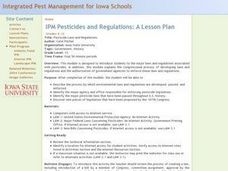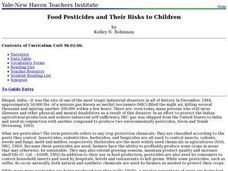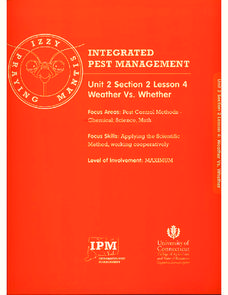Curated OER
Pesticide Watch Card
Students examine human health by identifying dangerous pesticides. In this agriculture lesson, students research the food production system in the United States and discuss dangers such as pesticides, chemicals and insecticides which...
Curated OER
Pesticide Laws and Regulations
Students explore the laws and regulations of pesticides. In this pesticides lesson, students research how laws are made and identify the agencies responsible for enforcing the laws. Students research the Internet for laws and bills...
Curated OER
The Effects of Pesticides on the Food Chain
Fourth graders generalize that all animals, including people, depend on plants as a food source. In this science lesson plan, 4th graders describe and construct a food chain, tell how pesticides enter the food chain, and discuss possible...
Curated OER
Ipm Pesticides And Regulations
Twelfth graders explore the process by which environmental laws and regulations are developed, passed, and enforced. They identify the major agency and office responsible for enforcing pesticide legislation and research the laws that...
Curated OER
EPA Pesticides Reduction
Young scholars examine the effects of pesticides on the environment and bugs. They answer questions as an assessment.
Curated OER
Food Pesticides and Their Risks to Children
Students examine an industrial disaster in India which affected the food for generations to come. In groups, they research the history of pesticides and place them into groups based on the type of pests they control. They partcipate in...
Curated OER
Pyrethroid Panic?
Future public health officials read about the exposure to pyrethroid pesticides and analyze box plots of pesticide use, diet, and children's ages. They discuss whether or not there are any relationships in the data. If you feel this...
University of Connecticut
Weather Vs. Whether
Monarch butterfly populations have decreased by 90 percent over the past 20 years due to misuse and ineffectiveness of some pesticides. Given the challenge to increase pesticide safety and effectiveness, the class, through discussion,...
Curated OER
Pesticides and Eggshell Thinning.
Students analyze the calcium content of egg shells as an introduction to the toxic effects of pesticides on biological systems.
Curated OER
Pollution in Our Watershed
Students conduct an experiment. In this pollution instructional activity, students review the vocabulary words watershed, pollution and pesticide. Students create watersheds, spray pesticides on them, create precipitation and observe...
Curated OER
Regents High School Examination: Living Environment 2009
Emerging ecologists need a full understanding of life, from the inner workings of a cell to the complex relationships among organisms. This examination is meant to assess high schoolers after an entire year course on the living...
Curated OER
Regents High School Examination: Living Environment 2007
Environmental science enthusiasts show what they know at the end of the year by taking this full-fledged final exam. They answer multiple choice, graph interpretation, and essay analysys questions, 73 of them in all. Topics range from...
Curated OER
Pesticide Prevalence
Learners investigate the prevalence of pesticides in their communities by
searching their homes, visiting local stores and talking to extended family and friends. They conduct their search by classifying pesticides based on the pests...
Curated OER
Pesticide Use: Environmental Awareness and Impact of Conservation Organizations
Eleventh graders examine the history of public concerns associated with pesticide use, and identify conservation organizations that examine pesticide use. They write reports to evaluate conservation organizations.
Curated OER
Lithosphere and Groundwater
Focusing on the quality of our water sources, these slides are full of information about the aspects of our soil and groundwater that may affect pollution. The leaching of pollutants and their impact on health is explained. ...
Curated OER
The Influence of Human Activity on the Environment
The surge in human population in the last 2,000 years, due in large part to better health care, has brought a surge in the demand for resources and in pollution. The graphics, photographs, and real-life examples in a thought-provoking...
Curated OER
Natural Gardening
Students study the effect of pesticides on plants and insects. In this gardening lesson, students discuss the importance of insects. They define pesticides, evaluate their effectiveness and the problems they might cause. Students...
Curated OER
Operation Mexfly
Students research information about pesticides. Students discuss the history of the Mexican fruit fly. They experiment to discover malathion concentration levels in organisms. Students explore the effect of toxins at the top of the...
Curated OER
Arsenic and Lead Scavenger Hunt
Health wizards read and discuss an article about lead contamination then come up with a plan to help solve the problem. They get into groups to develop a community solution within the parameters of a budget, feasibility, and the source...
Cornell University
Beneficial Insects
A lot of people think of insects as pests. But actually, some insects are beneficial because they get rid of pests! After learning about beneficial insects, class members research given insects to find out if they are pests or predators.
Curated OER
Nutrition: It's In Your Hands
Fourth graders use this lesson to focus on their health, nutrition and the state of the environment. In groups, they examine the various types of land, water and air pollutants and compare and contrast a food chain with and without a...
California Academy of Science
Pollution in Our Watershed
The concept of a how pesticides and other chemicals pass through a watershed can be difficult for younger learners to grasp without a concrete example. In the activity here, some blank paper, markers, and a spray bottle are all you need...
Curated OER
Just Spray 'Em!?
High schoolers read the label of an insecticide and identify pertinent information. They tell that the higher the LD50 the less toxic the chemical. Students begin to extrapolate the impact of pesticide use beyond the death of the insect.
Curated OER
Weeds on the Windowsill
Students study farming and reasons to control weeds. They examine pesticides necessary for the control of weeds and the damage to the environment. Through experimentation, students plant seeds in different soils and determine if seeds...
Other popular searches
- Pesticides Food
- Harmful Pesticides
- Pesticides and Their Harm
- Pollution Pesticides
- Comparing Pesticides
- Pesticides for the Farm
- Agriculture Pesticides
- Pesticides and the Danger
- Synthetic Pesticides
- Pesticides and Insect
- Chemical Elements Pesticides
- Herbicides and Pesticides

























